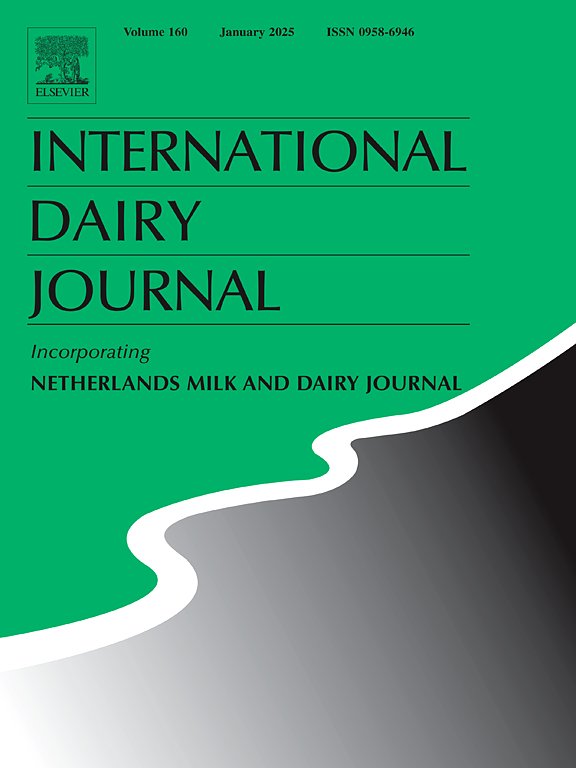益生菌发酵乳改善胃肠道健康:系统综述和荟萃分析
IF 3.4
3区 农林科学
Q2 FOOD SCIENCE & TECHNOLOGY
引用次数: 0
摘要
发酵牛奶含有益生菌,对健康有益。本研究探讨了益生菌发酵乳对排便频率和肠道菌群的影响,这一领域此前缺乏足够的证据。本研究纳入了从Cochrane图书馆、Embase和PubMed数据库中检索到的15项随机对照试验,时间从开始到2023年8月3日。符合条件的研究涉及食用富含益生菌的发酵乳制品的成年参与者,其结果与排便模式有关。使用随机效应模型提取和汇总数据以估计总体效果。本研究已在PROSPERO注册(CRD42023420924)。这项涉及882名个体的荟萃分析显示,与对照组相比,富含益生菌的发酵乳显著增加了排便频率(平均差值[MD] = 0.79次/周,95%可信区间[CI]: 0.19-1.39)。健康个体食用发酵剂发酵后4周内富含乳酸杆菌的产品后,排便频率显著提高(MD = 1.18, 95% CI: 0.08-2.28),最终乳酸杆菌活菌数增加(MD = 0.66, 95% CI[0.03, 1.28])。当干预持续超过四周时,有便秘症状的参与者排便频率有所改善。与食用安慰剂产品的参与者相比,食用富含益生菌的发酵乳的参与者粪便一致性改善更大(MD = - 0.24, 95% CI[- 0.44, - 0.04])。综上所述,富含益生菌的发酵乳改善了成人的排便频率和粪便一致性。影响在健康个体和有便秘症状的个体之间有所不同,这取决于干预的持续时间、使用的细菌菌株类型和使用的比较物。本文章由计算机程序翻译,如有差异,请以英文原文为准。
Transforming gastrointestinal health with probiotic fermented milk: a systematic review and meta-analysis
Fermented milk contains probiotics, which are known for their health benefits. This study explored the effects of probiotic-enriched fermented milk on defecation frequency and gut microbiota, an area previously lacking sufficient evidence. This study included 15 randomized controlled trials retrieved from the Cochrane Library, Embase, and PubMed databases from inception to August 3, 2023. Eligible studies involved adult participants who consumed probiotic-enriched fermented dairy products, with outcomes related to defecation patterns. Data were extracted and pooled using a random-effects model to estimate the overall effect. This study was registered with PROSPERO (CRD42023420924). The meta-analysis involving 882 individuals demonstrated that probiotics-enriched fermented milk significantly increased defecation frequency (mean difference [MD] = 0.79 times/week, 95 % confidence interval [CI]: 0.19–1.39) compared with the control. Healthy individuals significantly improved defecation frequency (MD = 1.18, 95 % CI: 0.08–2.28) when they consumed products enriched in Lactobacillus spp. using starter culture–fermented within 4 weeks, and eventually increased viable count Lactobacillus spp. (MD = 0.66, 95 % CI [0.03, 1.28]). Participants with constipation symptoms showed improved defecation frequency when the intervention lasted for more than four weeks. Stool consistency improvement was greater among participants who consumed probiotic-enriched fermented milk compared to those who consumed placebo products (MD = −0.24, 95 % CI [−0.44, −0.04]). In conclusion, probiotic-enriched fermented milk improved defecation frequency and stool consistency in adults. The effects varied between healthy individuals and those with constipation symptoms, depending on the duration of the intervention, the type of bacterial strain used, and the comparator applied.
求助全文
通过发布文献求助,成功后即可免费获取论文全文。
去求助
来源期刊

International Dairy Journal
工程技术-食品科技
CiteScore
6.50
自引率
9.70%
发文量
200
审稿时长
49 days
期刊介绍:
The International Dairy Journal publishes significant advancements in dairy science and technology in the form of research articles and critical reviews that are of relevance to the broader international dairy community. Within this scope, research on the science and technology of milk and dairy products and the nutritional and health aspects of dairy foods are included; the journal pays particular attention to applied research and its interface with the dairy industry.
The journal''s coverage includes the following, where directly applicable to dairy science and technology:
• Chemistry and physico-chemical properties of milk constituents
• Microbiology, food safety, enzymology, biotechnology
• Processing and engineering
• Emulsion science, food structure, and texture
• Raw material quality and effect on relevant products
• Flavour and off-flavour development
• Technological functionality and applications of dairy ingredients
• Sensory and consumer sciences
• Nutrition and substantiation of human health implications of milk components or dairy products
International Dairy Journal does not publish papers related to milk production, animal health and other aspects of on-farm milk production unless there is a clear relationship to dairy technology, human health or final product quality.
 求助内容:
求助内容: 应助结果提醒方式:
应助结果提醒方式:


